The 67th CGPA: A peace
visionary and a transformative leader

By
OACPA
August 4, 2025
FORT BONIFACIO, Taguig City – Lt. Gen. Antonio G. Nafarrete assumed
command of the Philippine Army as its 67th Commanding General on
July 31, 2025. Upon taking helm of the Philippine Army, the 67th
CGPA has issued a guidance that focuses on holistic development of
Army personnel, the organization's most valuable resource. The
command guidance also puts premium on sustained modernization,
doctrinal refinement and organizational development anchored on the
convergence of institutional efforts and the enduring values of
honor, professionalism and duty.
Lt. Gen. Nafarrete is a full-blooded scout ranger who has been
deployed all over the country and seen combat action up north in
Kalinga and Apayao; in the Visayas in Negros; and down south in
Basilan, Maguindanao, North Cotabato and the Zamboanga Peninsula.
His career began as a platoon leader in the 10th Infantry Battalion,
1st Infantry Division (1ID) and progressed through various elite
positions, including being a pioneer in organizing the 1st Scout
Ranger Company when the First Scout Ranger Regiment (FSRR) was
reactivated in 1991. His key leadership roles included commanding
the 1st Scout Ranger Battalion from 2008 to 2010, serving in the
Presidential Security Group (now Presidential Security Command)
where he led protective details domestically and internationally
from 2011 to 2015 and later in commanding the Sulu-based 1101st
Infantry Brigade, 11th Infantry Division. He also commanded the
Army's 1st Infantry and 6th Infantry Divisions prior to serving as
the 19th commander of the AFP Western Mindanao Command in November
2024.
The 67th CGPA has a notable background in peace-building efforts as
he served as the Chairman of the Government of the Philippines’
Coordinating Committee on the Cessation of Hostilities, one of the
mechanisms under the Bangsamoro peace process with the Moro Islamic
Liberation Front, which forged an amity accord with the government
in 2014.
Lt. Gen. Nafarrete is a decorated leader who received numerous
military awards for his exemplary service. He received the Gawad sa
Kaunlaran Medal in 2022 during his stint as the 1ID Commander in
recognition of his contributions to the mission of the organization
achieving peace in the region. He also received three Gold Cross
Medals from 1998 to 1999 for his gallantry and combat achievements,
as well as the Distinguished Service Star in 2013 for his
meritorious Service. Even earlier in his career, he received the US
Parachutist Badge and US Ranger Tab from the US Army Ranger and US
Army Infantry School in Continental United States while also
equipped with the Scout Ranger and Paratrooper Badge from FSRR.
The 67th Army Chief also excelled in his military and civilian
schooling. He is a proud member of the Philippine Military Academy
“Bigkis-Lahi” Class of 1990. After graduating from the prestigious
academy, he continued his pursuit of academic excellence and
professional development. He underwent the Basic Airborne Course and
Scout Ranger Course early in his military career. He also took the
US Army Ranger Course at the US Army Infantry School in 1995 and
courses on Joint Transition and Joint Professional Military
Education at the National Defense University, USA in 2005. In his
pursuit of personal development, Lt. Gen. Nafarrete also graduated
with Masters in Management Major in Public Administration from the
Philippine Christian University on 2013.
In his first command conference, the 67th CGPA gave his marching
order for the 110,000-strong Philippine Army to stand steadfast in
its mission to provide responsible, credible and capable forces to
the AFP Unified Commands in support of the AFP’s Campaign Plan
“Tatag Kapuluan.”
Eight years since
Marawi conflict, unresolved issues of displaced and missing people
hamper lasting peace
|
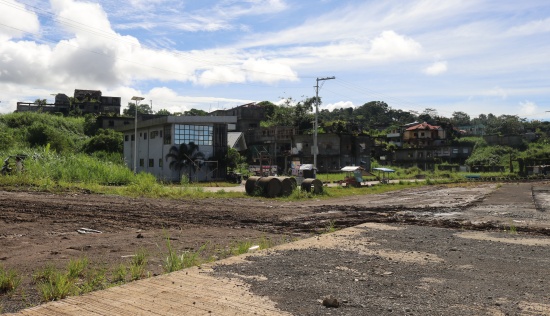
The
most affected area in Marawi remains largely a ghost town
with over 8,000 of its former residents still living in
transitional shelters. (Photo by B. Sultan/ICRC) |
By
ICRC
May 23, 2025
MANILA – The path
to lasting peace remains fragile in Marawi City in southern
Philippines because of unresolved issues like prolonged
displacement, limited support and lack of answers for families whose
loved ones are still missing, eight years since the conflict.
“It is disheartening to
see so many families – around 8,200 people – living for eight years
in inadequate conditions in shelters that were supposed to be
temporary. They are now paying rent and yet have irregular access to
clean water, adding immense strain to their daily lives,” said
Johannes Bruwer, head of the Manila delegation of the International
Committee of the Red Cross (ICRC).
Although the Philippine
government has made significant efforts, such as the construction of
public infrastructure in the most affected area (MAA) and the
creation of the Marawi Compensation Board, rebuilding their homes
remains a distant dream for some families who claim that the
compensation they received is not enough and for those who are
burdened by the documentation required to receive their payouts.
The ICRC continues to urge
the national, regional and local governments – especially its newly
elected officials – to work together to hasten the rebuilding of the
most affected area while ensuring that basic services are provided
to people in transitional shelters.
“Eight years is a long
time; people have been displaced for far too long. For the
residents, returning to their neighbourhoods is a step toward
normalcy and a necessary part of their healing. Ensuring their full
recovery is not only a humanitarian imperative but also key to
lasting peace,” Bruwer said.
The ICRC has been helping
the people of Marawi access clean water, especially in certain parts
of the least affected area where water is now available
round-the-clock. The ICRC is looking forward for government agencies
to complete the remaining pipelines in Marawi’s water supply
network.
|
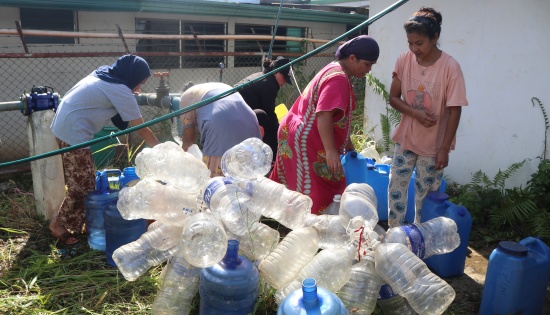
Eight
years on, displaced families in the Sagonsongan transitional
shelter still face problems with accessing clean running
water. (Photo by B. Sultan/ICRC) |
Over 300 registered cases
of missing people remain open
Since 2017, the ICRC has
advocated for people whose lives were upended by the Marawi
conflict, including the families of the missing. They continue to
suffer from the anguish and uncertainty of not knowing the fate and
whereabouts of their loved ones.
The obligation to prevent
people from going missing and to account for those who are reported
missing is enshrined in the Geneva Conventions and its Additional
Protocols, to which the Philippines is a party.
Apart from the emotional
burden, the difficulty of obtaining a legal document certifying the
absence or presumed death of the missing person has been repeatedly
raised as a major concern by their families. If this persistent,
systemic issue affecting all missing people is resolved by the
government, their families will be able to access social benefits,
pensions and property rights.
From 2017 to 2024, the
ICRC has helped more than 400 families of missing people by
providing mental health and psychosocial support and through
livelihood initiatives. The ICRC has been supporting the Philippine
National Police-Forensic Group with technical advice,
capacity-building and material support toward the identification of
remains in the Maqbara and Dalipuga cemeteries.
“We urge the Philippine
authorities to provide answers as soon as possible to the families
who have been patiently waiting. The authorities need to take the
necessary steps to clarify the fate and whereabouts of the missing,
as well as identify the remains that have been found. By doing so,
the government will help the families move toward healing and
trust-building,” Bruwer said.
He added, “Beyond just
remembering the missing people of Marawi, let us realize their
families’ shared hope for more support and for closure, so that they
can move forward with peace in their hearts.”
Crafting dreams
together

Susana
Grabillo and her husband proudly displayed their
handcrafted bags in their newly constructed concrete
home, reflecting their success in every life's
challenges. |
By
JOSEPHINE RAMOS
July 19, 2024
SAN PABLO CITY –
Susana Grabillo, 55, from Barangay Basiao, Basey, Samar, continues
to weave her dreams into a thriving venture with her husband on her
side.
Susana started helping her
parents at an early age. She initially weaved mats alongside her
mother in Saob Cave, while her father worked as a fisherman. Her
exposure to weaving from a young age enabled her to develop skills
in the craft.
As a child, she was always
eager to assist her parents. She began selling various fruits in
their barangay, which helped her buy school supplies.
In 1979, Susana's family
relocated to Manila where they made a living selling eggs. Despite
the challenges, she completed her elementary and high school
education. In 1994, she took a six-month vocational sewing course in
a facility in Pasay.
“I persevered in learning
sewing because I have bigger dreams for myself and my family. I know
I can do more," she said.
Susana got a job at a
sewing factory in Taguig soon after receiving her certificate, then
to Sucat after six months. She eventually settled in Makati, where
she spent many years sewing dresses for dolls. During this time, she
met her now husband, who had been a tricycle driver in Manila.
The couple decided to get
married in 1996 and settled in Pasay to start their own family. They
lived there for years before moving back to Samar in 2001. They
resided with her in-laws until they could build their own house.
"My brother-in-law loaned
us P1,500, which we used as capital to raise native pigs in 2006. We
began with a sow and sold the piglets. For two years, this provided
for our family's needs," Susana said.
Due to the challenges of
pig farming, Susana transitioned to cooking and selling pancakes and
ice candy in a school close to their home while her husband worked
as a helper in a handicrafts factory. Her husband gradually learned
the weaving himself just by observing.
They got inspired to start
a handicraft business as it was easy for Susana to learn weaving
with her skills in sewing. In 2012, with just P700.00, they began
crafting slippers and coin purses from tikog grass. Over time, their
product line grew to woven bags, baskets, and mats.
"My husband became my
business partner. He would sketch product ideas, and I would figure
out how to bring them to life. This is how we expanded our weaving
skills and knowledge," Susana said.
Their business was
thriving until typhoon Yolanda struck in 2013. All their products
and weaving materials were destroyed, including their home. During
this time they received support from NGOs and CARD Bank, a
microfinance-oriented rural bank they had been a client since 2011.
"Even before Yolanda
struck, CARD Bank supported my business. I frequently applied for
loans to add to our capital. After Yolanda, I again utilized my
loans to purchase materials and restart," she said.
They slowly regained their
strength to start again, setting up a small hut to display a few
handicrafts they made. Fortunately, they found buyers from Manila,
Davao, and Cebu. They also seized the opportunity to bring their
handicrafts to Manila and participate in trade fairs, further
expanding their customer base.
The pandemic in 2020 posed
no hindrance to them as orders continued to flow. With her husband
by her side, they continued weaving in their small hut until they
were able to rebuild a concrete house in 2022.
"We are immensely thankful
to CARD Bank because, without the loans they provided, we wouldn't
have been able to sustain our handicraft business. They also opened
up greater opportunities for us; now we are suppliers to Mga Likha
Ni Inay," Susana expressed gratefully. MLNI is a member institution
of CARD MRI that aims to support microfinance clients in marketing
locally made products.
Susana's coin purses and
laptop bags are now available at the Mga Likha Ni Inay store,
providing a new way to introduce their product to more customers.
Currently, Susana has an
existing loan of P50,000 at CARD Bank, Inc., and plans to apply for
a bigger loan in the future to further expand her business.
For Susana, maintaining
hope and resilience during uncertain times is crucial. Despite
facing numerous challenges in life, she persevered with her dream,
and her determination has been rewarded with a thriving venture.
From roots to triumphs
|

Virginia
A. Orollo, an entrepreneur and CARD client from Leyte, has
proven that anyone can turn a business from humble
beginnings into entrepreneurial success. |
By
EDRIAN BANANIA
July 15, 2024
SAN PABLO CITY –
Virginia A. Orollo, a 50-year-old mother of 13 from Lourdes,
Pastrana, Leyte, shows how hard work and dedication can turn dreams
into reality. Her life is a true example of perseverance and
determination.
Growing up in a simple
family, Virginia learned the importance of hard work early on. Her
family's primary source of income came from selling local
vegetables, root crops like cassava, and homemade Filipino
delicacies. These humble beginnings taught her the values of
perseverance and dedication, which she carried into her own family
life and business ventures.
Virginia inherited the
skills to make binagol, a popular delicacy from Leyte made from root
crops like cassava and taro. Since the 1980s, she has mastered this
craft, which has become her main way of supporting her family.
"Making binagol requires
patience, effort, and time, just like achieving our dreams,"
Virginia shared.
Virginia and her family
faced numerous challenges, including a lack of raw materials,
shortages in business capital, difficulties in product distribution,
and building a business trademark in the community. Despite these
obstacles, she overcame them all with confidence and perseverance.
As the business grew, so
did the capital needs. In 2016, she met CARD, Inc., (A Microfinance
NGO), and took out her first small loan of P3,000, which later
increased to P15,000. She invested this money in her business.
"My journey as an
entrepreneur has been like a roller coaster. Many ups and downs
tested my patience and determination. But, with the support of my
family and help from CARD, I kept going and never gave up," Virginia
reflected.
During the COVID-19
pandemic, Virginia, her husband, and her two children continued
producing binagol, ensuring a steady income despite the crisis. "No
matter how many storms like Yolanda and pandemics come into our
lives, we will remain resilient and faithful to God," she said.
Their determination and
patience paid off. Their product, now officially named "Virginia",
is registered and approved by the Department of Trade and Industry.
From struggling to find
suppliers, Virginia now has loyal suppliers of raw materials, and
her binagol is showcased in one of the pasalubong centers in
Carigara, Leyte, significantly increasing their customer reach.
The price of Virginia
Binagol is P50.00 per piece and is delivered in bulk to customers
three to four times a week.
"To those who want to
start a business, it's crucial to focus on maintaining the quality
of your products and services. This is how you stay present in the
business world," Virginia concluded.
Looking to the future,
Virginia hopes to pass her skills on to her grandchildren and future
generations. She believes that instilling these values and skills in
the younger generation will keep their family legacy alive and
empower them to face life's challenges with patience and
determination.
Virginia's journey shows
the importance of perseverance, dedication, and the unwavering
support of family and community in achieving one's dreams. Her
success story of turning root crop products into a thriving business
will inspire others to pursue their passions and positively impact
their lives.
Challenges and
opportunities in embracing Distance Learning: Insights from NMP
study
|

Ms.
Zenaida Eugenia D. Palita, presenting the research findings
on Investments on Distance Learning in Philippine Maritime
Training Institutions during the DMW-NMP Maritime Research
Forum on June 20, 2024 at Hotel H2O, Manila. |
Press Release
June 27, 2024
TACLOBAN CITY – In
response to the accelerating digital transformation within the
maritime industry, the National Maritime Polytechnic (NMP) conducted
a research study on the Investments on Distance Learning in
Philippine Maritime Training Institutions (MTIs) in CY 2023.
Findings of the study
unveiled that among the 87 surveyed Maritime Industry Authority
(MARINA)- accredited MTIs, 49% (43 MTIs) have incorporated distance
learning into their programs, with 39 providing responses. These
institutions made substantial investments in manpower, technology,
and infrastructure to comply with MARINA Advisory No. 2020-59. This
included hiring trainers, IT staff, and administrative support, as
well as upgrading of information and communications technology (ICT)
infrastructure like Learning Management Systems (LMS), internet
connectivity, and training facilities.
Manpower resources were a
crucial focus, with varying compensation schemes and a need for
additional training among instructors and assessors to effectively
deliver online training. Most MTIs relied on existing staff or
trainers to transition training materials to online formats, with
limited involvement of external subject matter experts (SMEs). MTIs
primarily utilized cloud-based LMS like Google Classroom and Zoom,
though stability of internet connectivity remained a concern,
addressed predominantly by increasing bandwidth rather than
acquiring new connections.
Financial constraints
emerged as a major barrier, alongside preferences among instructors
for traditional face-to-face teaching methods and the challenge of
meeting MARINA's stringent compliance requirements for online
training accreditation.
These concerns were echoed
by MTIs that have yet to adopt distance learning, who also cited
inadequate internet infrastructure as a significant obstacle.
Post-pandemic, some MTIs
reported reduced demand for distance learning, attributing it to
improved health conditions and the preference for in-person
training.
These findings underscore
the need for targeted support and streamlined regulations to
facilitate broader adoption of distance learning among Philippine
MTIs, ensuring they can effectively integrate digital solutions into
maritime education and training to meet evolving industry demands.
The study recommends
significant actions for the Philippine government, including
upgrading of ICT infrastructure and providing high-volume,
high-speed internet access, particularly in underserved areas and
public institutions. Legislative measures are urged to ensure
reliable internet and power supply across the country, crucial for
seamless online education. Furthermore, partnerships and agreements
with telecom companies are encouraged to provide stable connectivity
and support IT infrastructure development.
Government subsidies,
funds, and scholarships are proposed to support MTI personnel and
seafarers participating in distance learning, alongside policy
support, research, and regular evaluation of online education
initiatives. Public awareness campaigns are also recommended to
promote the benefits of distance learning in maritime education.
It was also recommended to
MARINA to simplify accreditation processes with clear guidelines and
standardized training standards applicable to all MTIs in terms of
STCW mandatory training courses. Flexibility in regulatory
frameworks is advised to expedite the adoption of distance learning
methods. The establishment of specialized training centers and the
standardization of software used in distance learning are emphasized
to ensure consistency and quality across institutions.
The study advocates for
further research into the advantages and challenges of online
training within Philippine maritime education, aiming to
continuously refine educational practices. These recommendations aim
to create an enabling environment for advancing distance learning in
Philippine MTIs, aligning education with industry demands and global
trends.
World Water Day:
Bringing safe drinking water closer to conflict-affected families in
Misamis Oriental
|

Ishfaq
Muhammad Khan (third from right), head of ICRC’s Butuan
office, joined residents, officials from the local
government unit and PRC volunteers during the handover of
Alagatan’s new water system. (Photo by M. Lucero /ICRC) |
By
ICRC
March 20, 2024
MAKATI CITY – For
years, the people of Barangay Alagatan in Gingoog City, Misamis
Oriental, have had a difficult time getting clean drinking water.
Their situation worsened in 2022, when an armed conflict prevented
them from going to the nearest spring, their only source of safe
water. However, a newly completed water supply system, one that the
residents have built themselves, is set to improve their standard of
living.
The new water supply
system, built by the villagers through a cash-for-work program, was
a project implemented by the International Committee of the Red
Cross (ICRC) in coordination with the local government. It was
unveiled on 7 March 2024 during a handover ceremony attended by
community members, local authorities and representatives of the ICRC
and its partner, the Philippine Red Cross (PRC).
ICRC engineers designed the system, supplied the materials and
equipment, and provided technical support to the construction works.
Approximately 700 people will benefit from the project, and the
system provides water to the barangay office, elementary school, and
health centre.
The completion of the
water system comes just around World Water Day on 24 March 2024.
Commemorated annually, World Water Day aims to raise awareness about
the billions of people around the world who do not have access to
clean and safe water.
“People in remote areas
are at a higher risk of getting life-threatening diseases if they do
not have access to clean water. Having a reliable water system
improves a community’s hygiene standards, and it also helps them
sustain their livelihoods. This project, completed just a few weeks
before World Water Day, is a step toward the improvement of living
conditions in Alagatan,” said Ishfaq Muhammad Khan, head of the
ICRC’s Butuan office.
Almost 85 residents
started constructing the water system in September 2023. They
installed a five-kilometer pipeline, five storage tanks and 19 water
faucets.
On 5 March 2024, a hygiene
promotion activity was done by the PRC for the residents.
The ICRC is a neutral,
impartial and independent organization with an exclusively
humanitarian mandate that stems from the Geneva Conventions of 1949.
It helps people around the world affected by armed conflict and
other violence, doing everything it can to protect their lives and
dignity and to relieve their suffering, often alongside its Red
Cross and Red Crescent partners.

Power grid operator
NGCP billed P2.4B worth of CSR, PR expenses to consumers

Since January 2023, the Energy Regulatory
Commission has held 14 hearings to determine how much the NGCP
should charge customers. The result of the investigation could mean
refunds or higher electricity bills in the coming years.
By
ELYSSA LOPEZ
Philippine Center for Investigative Journalism
November 7, 2023
MANILA – As the sole public utility
in charge of power transmission lines, the chief mandate of the
National Grid Corporation of the Philippines (NGCP) is to ensure the
reliability of the country’s electricity. So when a government
representative found that the company had included corporate social
responsibility (CSR) activities as part of its operating expenses,
she sought an explanation.
“Are CSR expenses necessary for the provision of the transmission
services by NGCP?” asked Marbeth Laconico, corporate secretary of
the National Transmission Corporation (TransCo), during a hearing
called by regulators.
Transco is the state entity that owns the power transmission grid,
which brings power supply from generating plants to electricity
distributors. NGCP, owned by a consortium of Filipino tycoons and
the State Grid Corporation of China, won the concession deal to
operate it after a public bidding in 2007.
Questions over the NGCP’s finances have grown in recent years, as
the transmission operator, a state-sanctioned monopoly, reported
higher profitability. Last year, NGCP reported P34.7 billion in net
income on nearly P62 billion in revenues. Net profit margin grew to
56.15% from 47.6% year-on-year.
Yet based on its financial statements from 2016 to 2022, NGCP passed
on to consumers P2.4 billion in expenses for “public relations and
corporate social responsibility,” P46.2 million in “charitable
donations,” and a donation of P942 million for a “COVID-19
Preventive Drive.”
“NGCP values not only the quality of [its] transmission service. We
also like to put [a] premium [on] engaging with communities, which I
suppose all companies are undertaking as part of their corporate
social responsibility projects,” Raymund Fontillas, financial
controller of NGCP, told regulators.
Regulators have also sought explanations for the huge amount spent
by the grid operator on salaries and benefits paid to employees, as
well as expenses due to force majeure such as natural calamities.
Since January 2023, the Energy Regulatory Commission (ERC) has held
14 hearings to determine how much the NGCP should charge customers
for the period 2016 to 2022, the fourth round of regulatory reviews.
TransCo and distribution utilities like Meralco grilled the NGCP
during the hearings, where the exchange between TransCo’s Laconico
and NGCP’s Fontillas happened.
Transmission rates are supposed to be set every five years, the
length of a regulatory period. But that has not happened in the past
decade. The last time the NGCP had a regulatory review was in 2010,
which determined the maximum allowable revenue it could earn for
2010 to 2015, the company’s third regulatory period.
The ERC did not call for a formal review of the rates until it
issued the Amended Rules for Setting Transmission Wheeling Rates (RTWR)
in 2022, which officially began the fourth regulatory review.
It does not mean the NGCP has stopped collecting fees from
customers, however. The company has maintained an average net profit
margin of 47.83% from 2016 to 2022. Based on its financial
statements, the company earned an average of P23 billion annually
during the five-year period.
This delay had been the subject of multiple Senate and House
hearings, on top of NGCP’s own delay in the construction of its
interconnection projects that add to consumers' monthly electricity
payments.
At least 9% of what Filipinos pay for electricity goes to
transmission charges. This means that for every P100 spent on the
electricity bill, P9 goes to the NGCP.
How much that 9% costs monthly is determined by the ERC, the
quasi-judicial body in charge of regulating the energy sector.
Insurance bought from shareholder’s firm
The regulatory review hearings provided a venue for the NGCP to
explain the expenses that had been questioned multiple times by
critics.
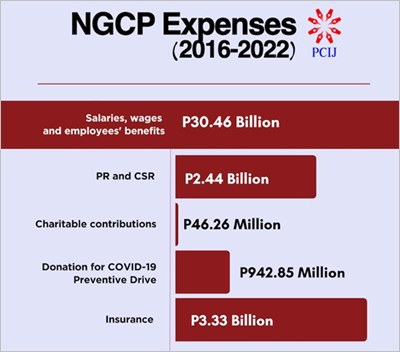
Among other expenses questioned during the hearings were force
majeure events (FMEs). For the fourth regulatory period, the NGCP is
applying for P1.057 billion worth of FME claims, including related
costs that occurred after 2010 or before the fourth regulatory
period.
Such expenses can be passed on to consumers, subject to the approval
of ERC. Natural disasters such as typhoons, earthquakes, and
landslides, or man-made disasters such as war or riots, are
considered as FMEs.
Under the concession agreement between the NGCP and TransCo, the
former is mandated to insure its assets. NGCP’s financial statements
showed the company spent P2.8 billion in insurance payments from
2018 to 2021, which include industrial all-risk insurance, a type of
policy that allows the policyholder to protect assets from risks
other than fire.
Almost half of insurance policies during the period, or about P1.3
billion, were procured from Prudential Guarantee and Assurance Inc,
one of the country’s largest non-life insurers. Its chairman, Robert
Coyiuto Jr., owns one of the shareholders of NGCP: Calaca High Power
Corp.
Reeva Shane Viado, corporate financial analyst of the Power Sector
Assets and Liabilities Management Corp. (PSALM), the state entity
that restructured the energy sector, sought clarification during the
hearing from NGCP if it had claimed any amount related to FMEs from
its insurance providers.
“It is just our position… that if NGCP has already recovered any
amount from its insurance providers, such amount should not be
included in this revenue under the recovery proposal of NGCP,” Viado
said.
The NGCP representative failed to respond to the question.
The ERC also posed “clarificatory questions” regarding the
compensation package of NGCP employees. In August, the commission
asked NGCP to provide a detailed breakdown and explanation of
salaries, wages, and employee benefits from 2016 to 2020.
Salaries and employee benefits, which totaled P20.9 billion from
2016 to 2020, were the second biggest expense item during the review
period.
Public records showed the NGCP employs about 4,700 employees. That
means each employee earned P4.4 million a year on average, or about
P371,000 a month.
Financial statements also revealed that key management personnel had
enjoyed “short-term benefits” that averaged P346 million from 2016
to 2020. The documents however were silent on what kind of benefits
were paid to these employees.
Fourth regulatory review
With the delay in its regulatory review, the NGCP has been billing
customers based on 2010 rates. A paper by University of the
Philippines economics professor Joel Yu found that the company
“continues to enjoy the rates of return determined by the ERC which
are no longer reflective of the opportunity cost of capital.”
As the rates were determined based on prevailing market conditions
–
just after a financial crisis – a premium was placed on the risk
taken by the NGCP in operating the country’s transmission grid. The
economy has since recovered.
The ERC uses a performance-based review in determining the NGCP’s
wheeling rates. This means the company may obtain cash incentives in
case it performs beyond the target criteria set by the commission.
These criteria are supposed to be reviewed every regulatory period.
Because of delays in the review, the NGCP was allowed to recover an
interim maximum annual revenue from 2016 to 2020 based on criteria
set in 2010. In the ongoing review, the NGCP claimed that customers
owed it P316 billion, or the total revenue requirement from 2016 to
2020.
Based on PCIJ’s analysis of available data, that amount was at least
28% higher than what the NGCP had charged customers during the
review period.
ERC asked the NGCP during the hearings how much the revenue
requirement would translate to per-kilowatt-hour rates, but the grid
operator was unable to reply.
The ERC has decided to catch up on the delay and extend the duration
of the fourth regulatory period, 2016 to 2020, up to 2022, or from
five years to seven years.
The NGCP opposed this, citing the five-year intervals followed in
previous regulatory periods. In October, the ERC denied the plea,
which means the decision on the fourth regulatory review is set to
be published soon.
How the ERC decides on which expenses the NGCP can pass on to
consumers will result in either refunds or higher electricity bills
in the coming years.
Agusan del Norte
residents rebuild lives after armed conflict
|
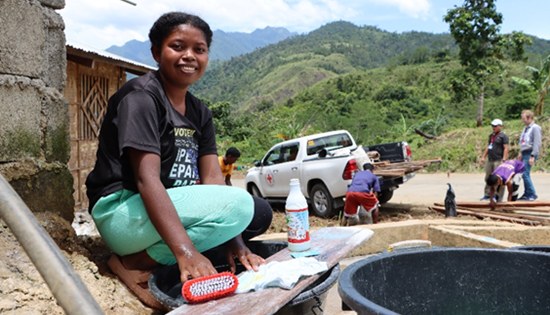
Yang-yang
Subay says the ICRC’s water project has helped them access
clean water and enjoy better health.
(Photo: M.Lucero/ICRC) |
By
ICRC
October 5, 2023
MAKATI CITY –
Yang-yang Subay remembers the time when conflict broke out in her
village and she had to flee for her life along with her family and
185 other people in March 2022. All they wanted was a place they
could live in without fear of violence. Barangay Puting Bato of
Cabadbaran City, Agusan del Norte province, became that haven for
them.
But the living conditions
were a challenge. Their dilapidated, makeshift homes provided
inadequate protection against heat or rain. A few of the families
were forced to live together in a single house, which they built
using scrap materials salvaged from their former village. They
lacked both space and privacy. Without access to clean water, proper
sanitary facilities or shelter, those were displaced began to have
health problems. “People here began to fall ill because of the dirty
water and many of us had regular stomach aches,” says 23-year-old
Yang-yang, a farmer.
Julie Subay, who was also
displaced, shares that the temporary house he built had only a
tarpaulin roof. “Water used to seep in whenever it rained heavily
and we used to get wet even inside our house,” he says.
A team from the
International Committee of the Red Cross (ICRC) visited Barangay
Puting Bato in March 2023 to assess the condition of the displaced
people.
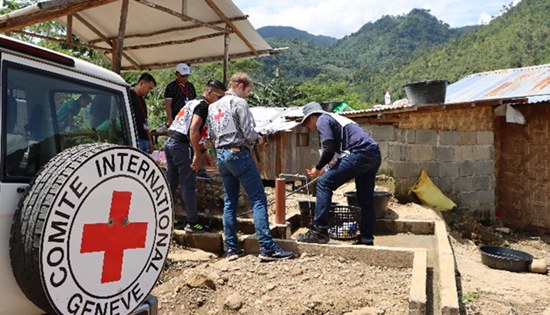
ICRC
staff check the new water tap stand that was installed in
the village. (Photo: M.Lucero/ICRC) |
The community lives
several kilometres away from their agricultural land and forestry
area and have limited access to basic supplies, timber and water.
This made it hard for them to build sturdy homes. We also discovered
that the residents didn’t have proper toilets because of which they
were even more susceptible to diseases,” says David King, the ICRC’s
water and habitat engineer. Responding to the needs of those
affected by armed conflict on a purely humanitarian basis, the ICRC
built a new water pipeline in the village and provided water filters
for each family. The ICRC team also built another water outlet so
that villagers don’t have to queue up for several hours to collect
water from the only outlet that the village had previously.
To ensure that community
members can repair their homes, install proper roofs and set up
toilets, the ICRC provided them with construction materials. The
Philippine Red Cross also held sessions to raise awareness about the
importance of cleanliness and good hygiene practices.
Melanie Subay, a
28-year-old farmer, says her family’s life has changed for the
better since they received help from the ICRC. The water is no
longer as dirty as it was and the additional water tap is helping
villagers to use their time a little more efficiently. “We used to
wait for many hours to collect drinking water from the single tap in
our area. I used to go to the riverside and wash my clothes. But it
was difficult to carry all the clothes and walk for miles. That is
why all of us are happy that we have another water source near our
homes,” she says.
Julie, her neighbour,
agrees. “My house looks better now and I no longer worry about the
rain. We also don’t feel as hot as before because we have used woven
bamboo mats for the walls and the roof,” he says.
A Woman of Culture,
LOREN LEGARDA
|

Senate
President Pro Tempore Loren Legarda champions Philippine
heritage fabrics in her daily and formal wear. Here, she is
in an abaca silk wrap with piña belt from La Herminia Piña
Weaving Industry of Kalibo, Aklan. |
By
DTI-Bureau of Domestic Trade Promotion
October 4, 2023
MAKATI CITY – The
name Loren Legarda has always been synonymous with the conservation
and promotion of Philippine culture and arts, traditional knowledge,
and indigenous systems.
Senate President Pro
Tempore Loren Legarda’s pursuit to increase the level of cultural
heritage awareness to preserve and protect our age-old knowledge,
traditions, and practices that we inherited from our forefathers can
be seen through all her efforts to champion the cause of cultural
preservation and advancement.
Capacitating culture-based
livelihoods
With a distinguished
career as a journalist and public servant, and a deep-rooted passion
for cultural heritage, Legarda has emerged as a remarkable figure in
Philippine society – a true woman of culture.
This advocacy has led her
to author and sponsor legislative measures and support programs and
initiatives that promote Philippine culture and arts, protect the
rights and traditions of the indigenous peoples, and advocate for
cultural integrity and culture-based livelihood.
“Tayong mga Pilipino ay
sadyang malikhain. Our love for the arts is immeasurable, and this
can be seen in our ancestors’ works. We have to promote it as well
as embrace it. The world needs to know more about the Filipino
culture and artistry – our own identity,” Legarda said.
As a long-time advocate of
cultural heritage and Micro, Small, and Medium Enterprises (MSMEs),
Legarda emphasized the need to capacitate MSMEs, including
culture-based livelihoods, as part of the overall strategy on
economic development, providing opportunities for support and
growth, and ensuring that their needs are addressed.
“We need to sustain our
gains by strengthening our MSME programs because aside from
generating employment opportunities and better incomes, MSMEs are
powerful platforms for promotion of viable rural livelihoods,
cultural preservation, socioeconomic empowerment of indigenous
communities, and environmental protection,” Legarda, author and
principal sponsor of the Magna Carta for MSMEs said.
Recently, the Cultural
Mapping Law authored by Legarda was enacted, which sought to make
heritage an inclusive tool for local and national development,
employing a grassroots approach that empowers local communities to
identify and assign cultural value to properties that are important
to them.
Cultural mapping provides
a powerful tool for MSMEs and indigenous communities to infuse
cultural richness into their livelihoods. By preserving and
celebrating their cultural heritage, these enterprises can
differentiate themselves in the global marketplace, create
sustainable livelihoods, and contribute to the preservation of
cultural diversity.
“It is but fitting to help
bring our culture closer to our people, to reawaken the citizens’
pride in our culture, history, and heritage, and to strengthen our
nationalism. We must explore initiatives to reintroduce our culture
and traditions, especially to the newer generation. We must gather
more heritage warriors to conserve and protect the Philippine
cultural heritage effectively,” Legarda said.
Empowering the Philippine
Cultural Capital
Aside from the Magna Carta
for MSMEs and the Cultural Mapping Law, the four-term Senator
initiated several programs and policies to promote our people’s arts
and cultural diversity.
To preserve the art of
Filipino weaving, Legarda pushed for the strengthened implementation
of the Philippine Tropical Fabrics Law, which she principally
authored, as it seeks to expand the tropical fabrics industry and
support the local and indigenous weavers and artisans. She also
coauthored the National Cultural Heritage Act, which primarily
protects the country’s cultural wealth and treasures.
Legarda also filed Senate
Bill No. 1866, or the proposed National Writing System Act, which
aims to promote patriotism among Filipinos by inculcating,
propagating, and conserving the cultural heritage and treasures of
the country through our indigenous and traditional writing systems.
Moreover, Legarda proposed the establishment of a Department of
Culture, which will initiate programs and activities promoting
national identity and culture.
The Senate President Pro
Tempore provided support for the Schools of Living Traditions (SLT)
Assistance to Artisans, Enhanced SLT Program; the establishment of
weaving, natural dye, and processing centers; and the establishment
of pineapple farms and fiber extraction facilities and abaca fiber
production in some localities in the country. She spearheaded
projects covering the protection and promotion of various cultural
traditions, including Hibla ng Lahing Filipino, the Philippines’
first permanent textile gallery; the Baybayin Gallery, the
Philippines’ permanent ancient scripts gallery in the National
Museum; and the Likha-an in Intramuros, a space and repository for
Philippine traditional arts. She also supported and honored the
Manlilikha ng Bayan (National Living Treasures) through the
establishment of cultural centers and a permanent gallery at the
National Museum of the Philippines.
Legarda’s tireless crusade
for the arts does not end in the traditional. She has been the
visionary and driving force behind the Philippines’ return to the
Venice Biennale after a 51-year hiatus, considered as the Olympics
of contemporary art. To further cement the Philippine presence, she
filed a bill that institutionalizes the participation of the
Philippines in the said exhibition. Through her initiative, the
Philippines is also set to be the Guest of Honour for the 2025
Frankfurt Book Fair, the world’s oldest and most prestigious book
fair. To strengthen cultural diplomacy, she initiated the
advancement of Philippine studies in United Kingdom, Germany, Spain,
Singapore, United States of America, South Korea, Australia, Canada,
Mexico, Belgium, Canada, and France.
Just last year, the
Philippine Creative Industries Development Act, which she
coauthored, was enacted, marking yet another milestone in her
relentless efforts to support cultural workers and advance
Philippine culture and arts.
Reignite and Reconnect:
NACF returns after a three-year hiatus
In 2016, to further
showcase Filipino creativity and ensure that the legacy of the
Philippine culture and heritage lives on, Legarda launched the 1st
National Arts and Crafts Fair in collaboration with the Department
of Trade and Industry to create a nurturing environment where our
indigenous crafts and artistry can flourish.
Legarda posed the
question: “The challenge against a fast-changing globalized world is
this: How do we promote, preserve, and sustain the artistic
creativity and culture-based crafts of our artisans deeply rooted in
our respective cultures? How do we support talented weavers, our
culture-bearers, and encourage them to continue their crafts and to
pass on their expertise and art to the next generation?”
The National Arts and
Crafts Fair emerged as a robust platform to address these
challenges. It was designed to support indigenous communities and
local entrepreneurs by providing them with the means to reach
broader local and even international markets. The fair became a
venue that showcased innovative products and celebrated the
indigenous culture and traditions of various Philippine regions.
However, in 2020, the
world grappled with the unprecedented challenges brought about by
the COVID-19 pandemic. The NACF faced an unforeseen hurdle, leading
to a three-year hiatus.
As the world slowly
recovers, the NACF returns with renewed vigor and purpose that drive
Filipino artisans and indigenous communities to continue creating,
innovating, and inspiring.
The return of the NACF
after the three-year hiatus signals a fresh opportunity for us to
showcase the rich and diverse heritage of our country which we must
protect, preserve, and rightfully pas on to the next generation.
“The NACF is back to open
doors of opportunities for our indigenous communities and local
entrepreneurs. Our culture is our soul, and while many do not
realize it, we need to release our cultural energy, which motivates
us to work and engage in meaningful and profound social interaction.
With the return of the NACF, I encourage our artisans to embrace our
diversity and always bring with you the legacies of Filipino
cultural heritage,” Legarda said.
“Undeniably, our MSMEs,
IPs, and culture-based livelihoods have been among the most affected
by the pandemic. To ensure the inclusive and sustainable development
of our cultural communities, we are happy to bring back the NACF. I
invite everyone to visit and participate in this year’s National
Arts and Crafts Fair, not just as spectators but as active
contributors to our cultural revival. Together, let us reconnect
with our roots, rediscover the culture and traditions that reflect
the identity and history of a community, and support the talented
individuals who keep our heritage alive,” she continued.
The Appeal of Bananas
Delicious fruit products
from the Philippines are best-sellers in the EU market
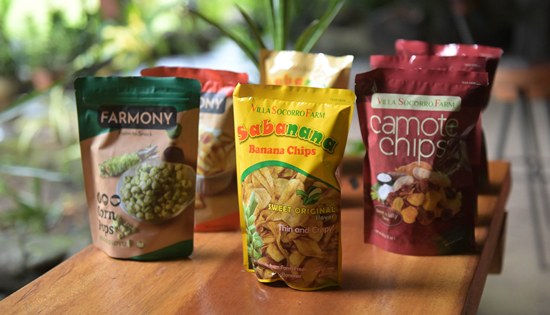
By
Knowledge Management and Information Service
August 24 2023
MAKATI CITY – The
relaxed charm of fourth-generation farmer 35-year-old Raymund Aaron
does not show the hard work he puts into successfully running his
small family business of manufacturing food products.
The company Villa Socorro
Farm and their factory are situated in Pagsanjan, Laguna province,
south-east of Manila.
The self-styled 'Banana
Chief' of this social enterprise, Raymund, oversees the production
and marketing of the company's famous banana chips.
He inherited his passion
for agriculture and farming from his father, incorporating a streak
of his own.
Right after obtaining a
Bachelor of Science in Management from Ateneo de Manila University
in 2009, Raymund joined the budding family business.
"I wanted to be an
entrepreneur for as long as I can remember. We used to grow bananas
on our land in Pagsanjan, and so, after graduating, doing business
using bananas seemed the perfect fit," Raymund shared.
An indirect start
The idea of exporting came
through his father's work in marketing for a multinational company,
which inspired him to engage in international business.
Starting off in 2008 with
an initial capitalization of P5 million, the company produced banana
chips, with the first export in 2014 to the United States.
The Health Safety
Certification from the Food and Drug Administration (FDA), a
requirement of the Philippine authorities, was obtained in 2012,
which further added credibility to the business as an exporter.
"We began exporting
indirectly through a local company that expressed interest in
distributing our products to buyers there."
Department of Trade and
Industry (DTI) helps reach Europe
Raymund, a regular at the
Philippine government’s DTI business matching events, recently
returned from a similar event held in Dubai coinciding with Gulfood
2023.
Regular participation in
business networking events and seminars since 2015 has provided
valuable knowledge and insights on export market access, including
the European Union (EU).
Be it the DTI or the
Center for International Trade Expositions and Missions (CITEM)
handling the International Food Exhibition (IFEX) Philippines, the
biggest international food trade show in the country, he always
found participation in the trade fairs to be beneficial.
"You never knew who you
would meet. I always carried samples of my products along." At one
such event arranged by the DTI-Export Marketing Bureau (EMB),
Raymund established a connection with the Philippines’ diplomatic
mission in Switzerland. Soon, samples from Villa Socorro reached a
few Swiss companies with the help of this link.
The products were a hit
with one distribution company. By the end of 2019, a 20-foot
container with 1,000 boxes that cost USD14,000 has been shipped to
Switzerland. "It was support from the EMB that helped us pursue
direct exports to Europe. We made our first link through them."
Recognizing the support he
received, Raymund is always willing to share his skills and
knowledge with other entrepreneurs and to contribute to local DTI
capacity-building initiatives.
Why the EU?
The EU appears to be a
lucrative market for the company as Raymund gradually expands the
product range by including sweet potato chips and corn snacks. About
80% of total current revenue comes from exports, while 20% comes
from sales at hotels, restaurants, canteens, airports, kiosks, and
selected supermarkets in the Philippines.
Villa Socorro's exports to
Europe are at 5%, with buyers in Switzerland, Norway and EU member
state the Netherlands. Raymund wants to increase business with
Europe, specifically with EU member states, which he regards as the
best destinations for healthy organic food products made from
tropical fruits.
"It is a market that is
willing to pay a premium for natural products."
EU buyers' requirements
Raymund's drive to grow
specifically in the EU market is evident in his readiness to comply
with the necessary requirements.
The REX number to avail of
the EU Generalized Scheme of Preferences Plus (GSP+) scheme to
export tariff-free to the EU was obtained on the recommendation of
the buyers to strengthen the business.
The Registered Exporter
System (REX) is a self-certification system wherein the origin of
goods is declared by economic operators themselves by means of
so-called statements about origin. To be entitled to make out a
statement of origin, an economic operator must be registered in a
database by the competent authorities. The economic operator then
becomes a "registered exporter."
Product and packaging
development were also adjusted. There is a shift to use a more
natural Brown Muscovado Sugar to suit customer preferences in the EU.
The company also created a
sub-brand, Farmony, to market its products in the EU. "Farmony
creates harmony between farmers, manufacturers, and consumers. Our
existing brand, Villa Socorro Farm Sabanana Banana Chips, really
targets Filipinos or people looking for Filipino products. We
created Farmony to have a product that can easily blend on the
shelves of the EU market," Raymund shared.
Social entrepreneur
Being on a farm allowed
Raymund to become a social entrepreneur. He understands well the
needs of the farmer.
To support banana farmers
around his family plantation, Raymund buys 98% of the fruit from the
community that he fondly refers to as “partner-farmers."
"We buy bananas from more
than 200 farmers in a radius of 5km around our farm. We only plant
2% of the bananas that we use for banana chips," he shared. By
processing 600,000 tons of bananas every year, he provides the local
farmers with a market for their produce.
He considers himself lucky
that things fell into place, enabling him to give back to the
community that helped him get to where he is today.
Gearing up for the future
"I am still here. I look
forward to expanding our business. Sticking with the snacks theme,
we're looking at making use of the abundant farm produce in our
region and the rest of the Philippines to create fun and healthy
snacks.
Raymund is determined to
transform the business into a reliable food company by creating an
entire line of banana products and drawing in loyal customers at
home and abroad.
The ARISE Plus Philippines
project is enabling Philippine exporters to take advantage of
European Union (EU) market access and the trade privileges granted
under the Generalized System of Preference (GSP+). It supports the
overall EU-Philippines trade relationship and trade-related
policies.
ARISE Plus Philippines is
a project of the Government of the Philippines, with the Department
of Trade and Industry as lead partner together with the Department
of Agriculture, Food and Drug Administration, Bureau of Customs, the
Department of Science and Technology, as well as the private sector.
It is funded by the EU with the International Trade Centre (ITC) as
the technical agency for the project.
Nature’s Legacy home
décor: Dare to innovate

Eco-friendly home décor
makes space in Europe
By
Knowledge Management
and Information Service
August 14, 2023
Respect for nature and humans
The founders of Nature’s
Legacy, husband-wife team Cathy and Pete Delantar, came from humble
beginnings with no plans to start a manufacturing business.
Witnessing the poverty in
their surrounding community, they made a commitment to help by
creating employment opportunities.
“Our Filipino upbringing
instilled in us a thrifty attitude towards the resources we were
given. We would use woven baskets or buyots when going to the public
market,” recalled Pete.
Cathy and Pete transformed
natural resources into patented sustainable materials to create
inspired pieces for the home, for business, and for life.
In turn, the couple
accommodated unskilled craftsmen, taught them the basics of material
application, and turned them into productive individuals.
Ditching dead wood
Nature's Legacy faced a
challenging journey as a sustainable manufacturer.
Its flagship product,
Stonecast – a handmade material that mimics real limestone – was
quickly imitated by other players in the industry.
“Realizing that we could
not compete on price, the company decided to focus on creating
something unique and different,” Pete shared.
During a walk on their
property in Compostela, Cebu, the founders stumbled upon piles of
forest debris that were being used solely as firewood.
With a background in
material application, they soon transformed the readily available
but ignored raw materials into the sustainable invention Naturescast.
Their current range of
products includes Naturescast, Nucast, Marmorcast, and Stonecast.
All four products align with the manufacturing company’s sustainable
product principles: recycled, biodegradable, ethical, and communal.
Destination: export
In 1983, Nature’s Legacy
began exporting to Canada and the United States. At that time, the
company's revenues ranged between P5.0 to P6.0 million per year and
the foreign exchange rate was P18 - P20 to the US dollar.
In 2002, the company made
its first exports to Germany. Today, almost 40% of Nature’s Legacy’s
total exports go to Switzerland and EU member states including the
Netherlands, France, Italy, and Slovenia.
GSP+ does the trick
One of the company’s
objectives is to attract customers who prioritize sustainability,
and who recognize the value and significance of sustainable,
circular, and innovative products and practices. This is the reason
the company has zeroed in on the EU as its niche market.
The EU’s Generalized
System of Preference Plus (GSP+) scheme for Philippine exporters has
created an attractive incentive for firms to do business with EU
member states since 2017, according to Pete, who learned about the
scheme through the Philippine Exporters Confederation, Inc. (PHILEXPORT)
and the Philippine government’s Department of Trade and Industry
(DTI).
“We learned that it
provides advantages not only to our company but also to other
Philippine exporters who sell products to the EU. The elimination of
tariffs on over 1,000 Philippine products under GSP+ can enhance
exports and increase competitiveness.”
Sustainable partnership
with the government
Pete expressed their
appreciation for the continued support from the DTI.
The company received
training, seminars, participation in trade shows, support in product
development, and business matching and networking.
“The agency allowed us to
know customers better – their European culture and design
preferences. By knowing the market, we can tailor-fit our products
and innovation to match their needs,” Pete shared.
DTI’s publications were
instrumental in Nature’s Legacy products getting noticed by the
buying public. Pete and Cathy’s engagement in various missions and
programs added to the buyer’s familiarity with the products.
Walking the talk
Pete and Cathy have not
forgotten their original resolve to support their community through
their business.
Some of the 89 current
employees of the company are second-generation workers who are
equipped with higher education.
“We make sure to take care
of our employees’ basic needs like food, clothing, and shelter. We
also provide them with subsidized housing and quarterly bonuses,”
shared Cathy, who, together with her husband, believes in the
Sustainable Development Goals in uplifting the lives of their
workers.
Their employees live a
mere 15-minute walk from their factory in Cebu and are therefore
contributing to reducing the carbon footprint of their operations.
Looking upwards with ARISE
Plus
Upon the recommendation
from PHILEXPORT, the company was engaged in the ARISE Plus
Philippines project, an endeavor designed to support small- and
medium-sized businesses in the country and open new doors of
opportunity.
“Our aspiration is that,
with the support of ARISE Plus, we can expand our reach to more
buyers and customers who prioritize and share the same values of
Sustainability, Circularity, and Innovation,” said Cathy.
This is also in line with
Pete and Cathy’s future goals for Nature’s Legacy.
Pete and Cathy, tenacious
experts who never give up, plan to introduce into the market a
compact yet revolutionary shelter for people facing disasters or in
need of temporary lodging during a transitional period.
The envisioned shelter is
a breeze to assemble, making it an ideal solution for women and
elderly members of the community looking to contribute to building a
resilient dwelling during trying times.
Nothing is holding back
the couple in daring to undertake innovative solutions, making smart
choices with the use of ingenious materials to produce a
quick-to-install shelter.
The ARISE Plus Philippines
project is enabling Philippine exporters to take advantage of
European Union (EU) market access and the trade privileges granted
under the Generalized System of Preference (GSP+). It supports the
overall EU-Philippines trade relationship and trade-related
policies.
ARISE Plus Philippines is
a project of the Government of the Philippines, with the Department
of Trade and Industry as lead partner together with the Department
of Agriculture, Food and Drug Administration, Bureau of Customs, the
Department of Science and Technology, as well as the private sector.
It is funded by the EU with the International Trade Centre (ITC) as
the technical agency for the project.
A bagful of success
Trendy PH handbags impress
fashionistas in Europe
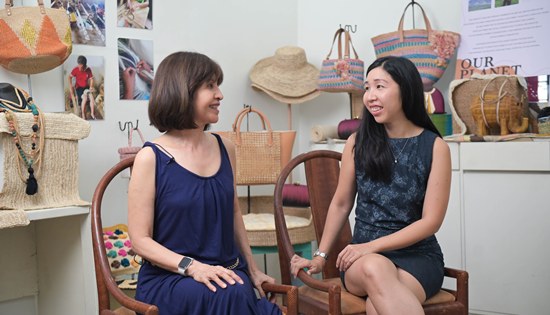
By
Knowledge Management and Information Service
August 10, 2023
MAKATI CITY –
Jennifer Lo is a living proof that an eye for aesthetics can be
inherited. Based in Makati City, Metro Manila, the third-generation
entrepreneur has carried on her family’s business of handicrafts –
the Larone Crafts, registered in 1984.
Growing up, she helped her
mother during trade shows, observing how business was conducted with
foreign buyers and taking minutes of business meetings.
After completing a short
course on Manufacturing Management at the Fashion Institute of
Design and Merchandising in Los Angeles, United States of America
(USA) in 2006, she worked with various fashion companies before
coming back to the Philippines to help in her mother’s handbag
business.
“I’m the steward of my
parents’ and grandparents’ hard work. My goal is to make the
business sustainable for another 20 years,” shared Jennifer.
Operating out of a compact
500-square-meter office that includes a production area and
warehouse on the top floor, she exudes a hands-on demeanor.
Tradition à la mode: When
tradition meets fashion
Larone Crafts’ designs are
modern but remain true to Pinoy traditions by incorporating Tinalak
weaves and the woven fabric Inabel. Natural plant fibers such as
abaca, raffia, and seagrass sourced from all around the Philippines
add an indigenous charm to her products.
The results are timeless
accessories that buyers can keep in their wardrobes season after
season.
“The bags are meant to be
used all year round. We do not make items that are just for a
certain season to be thrown away the next. We manufacture them to
last.”
In the collection of
Larone Crafts’ handbags, the signature hand-embroidered clutch bags
are a particular hit with buyers.
Carrying on the export
mission
The agility of Larone
Crafts in staying abreast with technological advancements and design
trends has kept it exporting successfully over the years.
The company’s first
exports were made in 1984 to the USA. Back then, Jennifer was only
three years old.
“I can see how conducting
international business at a time when the Internet was not yet
existing must have been quite a challenge,” said Jennifer,
expressing her appreciation for the ease and speed that
technological advancement has brought about over the years.
In 2009, when Jennifer
joined the company, she continued to step up to evolving market
trends.
“Smaller niche brands were
coming into the field. Rather than large containers of orders with
thousands of pieces of the same style, orders of several styles and
colors in a few hundred pieces were preferred.”
In 2022, following the
pandemic, 3% of Larone’s customers were from the European Union (EU),
90% from the USA, and the rest a mix from other countries.
Going international with
help from the government
For a long time, the only
way to start an international business was through participation in
trade fairs, which is not an easy thing to do alone.
The company has been part
of the Manila FAME almost every year since the 1980s. Showing at
Maison et Objet, NY Now, and Ambiente over the last 10 years has
also been fruitful.
“We received support from
the Center for International Trade Expositions and Missions (CITEM),
the export promotion arm of the Philippine government’s Department
of Trade and Industry (DTI), to participate in international trade
shows in the EU and in the USA. Before the internet and emails, this
was the only way of gaining new overseas customers.”
Jennifer feels that her
company’s participation in these trade shows has been instrumental
in reaching customers, particularly in the EU. Trade shows boost
market research, linkages, design aesthetics, and competitiveness.
She emphasized that
CITEM’s support in terms of product design, booth design and
implementation, and pre-show marketing has been invaluable in
upgrading her business.
“These are all high costs
that would be difficult for our small business to absorb when
initially trying to enter into a new market.”
GSP+ for the EU
Jennifer sees many
benefits from the EU Generalized System of Preference Plus (GSP+).
“The EU GSP + makes our
products more competitive in the EU market by reducing the cost of
importing our goods into the country for our buyers. It improves
access to the 27 countries in the EU.”
Larone Crafts is already
exporting to Spain and the Netherlands, with samples sent recently
to Italy which are expected to generate more orders.
“The EU is an attractive
export market for our company because of the ease of doing business
with their bilingual teams, the market’s love for sustainable,
handmade, and natural products, and the favorable trade policies
such as the GSP+.”
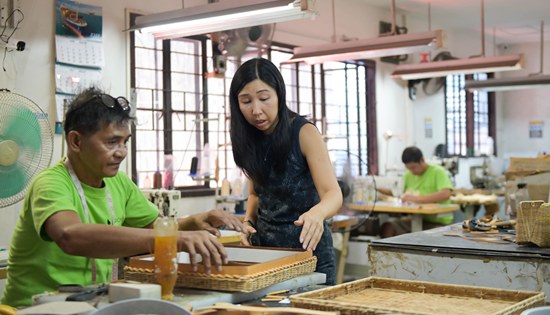
Leaving no one behind
As Jennifer works towards
expanding her product assortment in home and lifestyle products, she
is cognizant of those who work for her.
Depending upon the volume
of orders, in any given season, she employs approximately 100
workers.
She not only retained
artisan families from her mother’s time, but also sources from small
businesses that employ women.
“We work with weavers and
artisans in their communities from all over the Philippines, giving
them a reliable livelihood and helping to preserve the region’s
traditional crafts.”
The ARISE Plus Philippines
project is enabling Philippine exporters to take advantage of
European Union (EU) market access and the trade privileges granted
under the Generalized System of Preference (GSP+). It supports the
overall EU-Philippines trade relationship and trade-related
policies.
ARISE Plus Philippines is
a project of the Government of the Philippines, with the Department
of Trade and Industry as lead partner together with the Department
of Agriculture, Food and Drug Administration, Bureau of Customs, the
Department of Science and Technology, as well as the private sector.
It is funded by the EU, with the International Trade Centre (ITC) as
the technical agency for the project.
Moneyed kin, personal coffers paved Senate victories in 2022

Senatorial candidates in the 2022 polls won
fresh terms by financing their campaign with money from family
members and money from their own pocket.
By
CHERRY SALAZAR
Philippine Center for Investigative Journalism
May 10, 2023
Loren Legarda won big time
in her comeback bid in the Senate last year, coming in second with
24.3 million votes. She got a lot of help from her son and father,
whose combined contribution to her campaign kitty totaled P136
million, based on her own declarations.
Sherwin Gatchalian
reported receiving a hefty P89 million from three family members,
while Juan Miguel “Migz’’ Zubiri and Joseph Victor “JV’’ Ejercito
each accepted at least P20 million from their parents to secure
fresh terms in the Senate during the 19th Congress.
Zubiri was eventually
elected Senate president.
It is expensive to run for
office in the Philippines. The 12 winning senators reported a total
campaign spending of P1.5 billion in their SOCEs, an amount that
watchdogs said may be an underreporting. Three candidates ran ads on
mainstream media that were worth more than P1 billion, based on
published rate cards or before discounts were given to the
candidates.
Billionaire donors and
business executives have always played key albeit covert roles in
the campaign of national candidates.
But the 2022 senatorial
race showed that some candidates relied more on the money of family
members as well as their own to fund their campaign.
Election lawyers said
receiving financial support from relatives could lead to a possible
conflict of interest especially if the family members also have
business interests.
“[T]here is a tendency for
campaign contributors to be able to dictate or influence the
candidates should they win the election. So when you have a business
interest… then this particular influence is magnified,” said lawyer
Izah Katrina Reyes, policy consultant of poll watchdog Legal Network
for Truthful Elections (Lente).
The “quid pro quo
agreement” for a business to benefit from the influence of an
incumbent official can be “really a possibility,” Reyes said.
Election lawyer Donnah
Guia Lerona-Camitan said it also “raises questions whether elected
officials can make impartial decisions against the interests of
their family businesses for the benefit of the public’s interest.”
Six of the 12 winning
senators received a total of P291.91 million from their own
families, according to the statements of contributions and
expenditures (SOCEs) that the candidates submitted to the Commission
on Elections (Comelec).
Family and personal funds
accounted for a fifth of the P2.18 billion total spending reported
by 48 candidates in their SOCEs. Sixteen candidates did not submit a
finance campaign report to the Comelec.
Two neophyte senators –
Mark Villar and Rafael “Raffy” Tulfo – funded their campaign from
their own pocket. Their combined campaign bill ran up to P170.61
million, based on their SOCEs.
A “limited or confined
support base,” such as electoral campaigns largely funded by
relatives or personal money, is not ideal, Reyes told Philippine
Center for Investigative Journalism (PCIJ) in an interview.
“What we really want is a
more distributed support base for our candidates in terms of seeing
their campaign contributions… We want more active participation from
our voters and the public,” she said.
Top donors backed Legarda
Two of the top five donors
backed the campaign of Legarda, who came in second behind actor
Robinhood “Robin’’ Padilla.
Her son Leandro Leviste
gave her P100 million, while her father Antonio C. Legarda shelled
out P36 million. These account for 86 percent of the senator’s
declared contributions.
Leviste is the founder and
president of solar energy firm Solar Philippines.
According to an earlier
PCIJ report, Leviste’s Solar Philippines cornered a significant
share of the government’s Green Energy Auction Program (GEAP), a
Department of Energy program that allows renewable energy developers
to bid for supply contracts at a set ceiling price.
During the first auction
in 2022, the firm won 90.58 percent of auctioned solar capacity, or
1,350 of 1,490.38 megawatts (MW), and 70.16 percent, or 1,380 of
1,966.93 MW, of renewable energy capacity across all technologies.
Solar Para sa Bayan Corp.,
a subsidiary of Solar Philippines, also received a 25-year
distribution franchise from Congress which then President Rodrigo
Duterte signed into law in 2019. At the time, Legarda held the lone
congressional seat for Antique province.
Some lawmakers, renewable
energy groups, and energy advocates opposed the legislative
franchise, as it “effectively grants a monopoly and exempts one
private company from the rules of competition and oversight.”
|
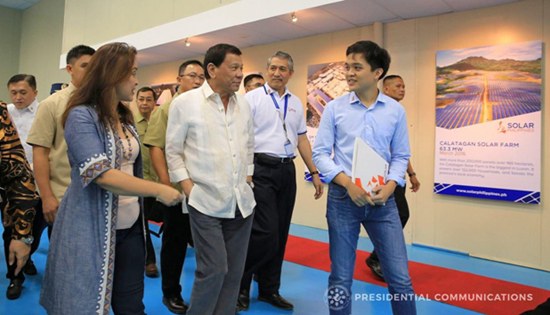
Solar
Philippines founder and president Leandro Leviste welcomes then
President Rodrigo Duterte and his mother, Sen. Loren Legarda, at
the firm’s factory in Sto. Tomas, Batangas. Solar Philippines
would be granted a 25-year franchise in 2019.
(Photo from the Facebook page of the Presidential Communications Office, August
2017) |
Former Comelec
Commissioner Luie Guia said a donor’s relationship with a candidate,
“whether there is a violation or not, is already a red flag for a
potential conflict of interest.” But he added that it is more
important that disclosures are honest.
Legarda said she did not
defend the bill on the floor and abstained from voting “out of
delicadeza” because the firm is owned by her son. “In fact, I would
always be out to make sure that there is no conflict,” she said in
2019.
Reyes said Legarda’s
abstention was “a good start to maintain neutrality…but what we
don’t see are the discussions maybe among colleagues.”
Currently, eight bills on
solar and renewable energy are pending at the committee level in the
Senate. None of the bills were authored by Legarda, but she has
publicly supported green initiatives in the past.
Gatchalian and family
firms
Family and business
partners helped Gatchalian secure his reelection. He ranked fourth
in the race with 20.6 million votes.
More than half of the
contributions he received, or P81.91 million, were from his kin:
over P58.41 million from his mother Dee Hua; P15.5 million from his
brother Kenneth; and P8 million from his maternal aunt Elvira Ting.
Dee Hua is the second top
individual donor, next to Leviste.
The Gatchalians have
interests in various industries from plastic manufacturing to hotels
and casinos, banking, and mining.
Earlier this year,
Kenneth, director of Altai Philippines Mining Corp., was embroiled
in a controversy over alleged illegal mining operations in
biodiverse-rich Sibuyan Island in Romblon. Protesting residents
accused the company of operating without necessary permits and
violating environmental policies.
The senator himself owns
9.71% shares in Wellex Industries, Inc., a mining and oil
exploration firm, according to the company’s reports to the
Philippine Stock Exchange (PSE) as of April 2023.
In separate bills,
Gatchalian proposed amendments to the Oil Exploration and
Development Act and the Philippine National Oil Company charter. He
also proposed income tax incentives for petroleum service
contractors. These bills were referred to the committee on energy,
where he sits as vice chair.
Bills on the suspension of
excise taxes and value-added tax on petroleum and petroleum products
were also referred to the ways and means committee, which he chairs.
The Gatchalian family was
also earlier linked to at least nine offshore companies, according
to the Pandora Papers. The family’s legal counsel claimed that the
offshore companies were incorporated for “legitimate investment
purposes” with plans to venture into “global trading.”
Gatchalian’s other backers
included Sergio Ortiz-Luis and wife Margarita, who chipped in P9.5
million and P2 million, respectively, to his campaign.
Sergio is the president
and chief executive officer of Philippine Exporters Confederation,
Inc. and chairman of the Philippine Chamber of Commerce and
Industry. He also sits on the board of Gatchalian-owned businesses,
including Waterfront Philippines, Inc.
Waterfront subsidiaries
won government contracts worth P234.5 million between January 2021
and March 2023, according to data from the Philippine Government
Electronic Procurement System (Philgeps).
Of these, 86.7 percent
were sealed through direct contracting and negotiated procurement.
Direct contracting does
not require submission of voluminous bidding documents, such as
price quotation or a preliminary (pro-forma) invoice with conditions
of sale. Negotiated procurement, on the other hand, is resorted to
under “extraordinary circumstances” such as two failed biddings.
The law distinguishes
between individual and corporate donors, but Lerona-Camitan said it
is “a red flag” if there is a “direct and causal link” between an
individual donor and a company that holds government contracts.
“This would be an indirect
violation of the Comelec prohibition,” she said. “What cannot be
done directly cannot also be done indirectly.”
The Omnibus Election Code
prohibits natural and juridical persons who hold contracts or
subcontracts to supply the government with goods and services from
making campaign contributions.
Parents for Zubiri,
Ejercito
The parents of Zubiri and
Ejercito also poured money into their campaign, propelling them into
the winner’s circle. Zubiri ranked eighth with 18.7 million votes,
while Ejercito placed 10th with 15.8 million votes.
Zubiri’s mother Maria Asuncion and his mother-in-law Lourdes Tan
donated P20 million each to his campaign.
His other top donor is businessman Francisco Tiu Laurel, Jr. who
also gave P20 million.
Laurel also contributed P30 million to Partido Federal ng Pilipinas,
the political party chaired by now President Ferdinand “Bongbong”
Marcos, Jr.; and nearly P8.75 million worth of airtime in GMA
Network for Padilla, SOCEs showed.
Laurel is president of Frabelle Group, which ventures into deep-sea
fishing and aquaculture, food manufacturing and processing, cold
storage, shipyard operations, and real estate, among others.
Frabelle Shipyard Corp., a subsidiary, won six different contracts
from the Mines and Geosciences Bureau (MGB) between January 2021 and
March 2023 totaling P15.69 million, according to Philgeps quarterly
reports.
Laurel also has interests in the energy sector through Markham
Resources Corp., which develops hydroelectric energy projects in
northern Luzon and in Mindanao.
After the elections, Laurel was appointed as a member of the
agriculture group of the Private Sector Advisory Council that was
formed in July 2022. The group was expected to help the government
address food security issues. Mr. Marcos concurrently serves as
agriculture secretary.
Antonio Tan and his son Miguel Alissandro also donated P10 million
each to Zubiri’s campaign. They are the corporate secretary and
president, respectively, of real estate company MVT Group and
cladding firm Fasclad, Inc.
Ejercito, for his part, disclosed getting P20 million from his
father, former President Joseph Ejercito Estrada, and P10 million
from his mother, former San Juan City mayor Guia Guanzon Gomez.
The senator also received P10 million from Edward William Tan,
founder and director of the Brent Group, distributor of liquefied
petroleum gas and other petroleum products, among others.
Ejercito called for the suspension of excise tax on fuel to mitigate
soaring prices of petroleum products during the campaign.
Meanwhile, Ejercito’s brother Sen. Jose “Jinggoy” Estrada did not
report receiving support from the former president. He identified
several media outfits as donors in his SOCE. The outfits denied
this.
Estrada secured the 12th spot with 15.1 million votes.
Cousin, sibling support Hontiveros, Cayetano
Reelectionist Sen. Ana Theresia “Risa” Hontiveros reported a
P3-million contribution from her cousin Marianne, former chair of
AirAsia, Inc., while returning Sen. Alan Peter Cayetano disclosed
receiving P500,000 each from his brother Rene Carl and sister-in-law
Mary Bianca Calalang.
Outside the family, Cayetano also benefited from the contributions
of big business, including P10 million from Jaime Santos dela Rosa
of Puregold Price Club, Inc.
Puregold was awarded government contracts between January 2021 and
March 2023 worth P1.67 billion, according to Philgeps data.
Cayetano’s other donors included businessmen Jorge Villacorta
Pascual, Jr. of JJ Drilltek Corp. and Danilo Michael Yamsuan of
Elaia Green Vehicles, each donating P10 million.
Yamsuan is the first cousin of Bicol Saro Partylist Rep. Brian
Raymund Yamsuan, who also chipped in P10 million to Cayetano’s
kitty.
Hontiveros placed 11th in the race with 15.4 million votes, while
Cayetano came in seventh with 19.3 million votes.
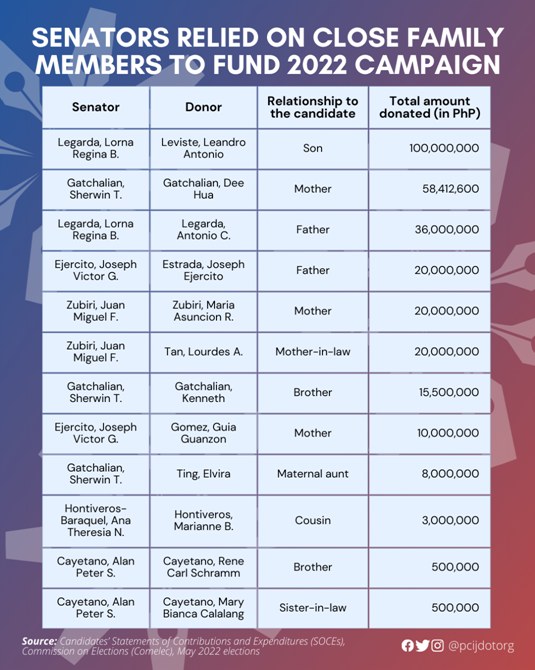
Self-funded campaign for Senate neophytes
Villar and Tulfo financed their own campaigns in their first bid for
a Senate seat, finishing sixth and fourth in the race and garnering
19.5 million votes and 23.4 million votes, respectively.
Villar’s campaign cost him P131.86 million. He is the son of real
estate mogul Manuel “Manny” Villar, Jr., who topped Forbes’ list of
Filipino billionaires in 2023 with a net worth of US$8.6 billion.
Tulfo, a prominent and feisty broadcast personality, meanwhile,
reported spending P38.74 million on his campaign.
His family is no stranger to politics and governance.
His wife Jocelyn Pua and son Ralph Wendell Tulfo are both members of
the House of Representatives, representing ACT-CIS partylist group
and the 2nd district of Quezon City, respectively.
His sister Wanda Tulfo Teo was the tourism chief for two years
during the Duterte administration, while his brother Erwin Tulfo had
a short stint as social welfare secretary during the first few
months of the Marcos administration in 2022.
While self-funded campaigns may lead to greater autonomy and
minimize external influence when a candidate gets elected,
legislating or encouraging such may be considered “anti-poor,”
Lerona-Camitan said.
“It would in effect bar less fortunate candidates from running for
public office. Additionally, it would undermine the well-protected
principle on equal representation enshrined under our Constitution,”
she said.
Padilla’s ‘secret weapon’ not disclosed in SOCE
Padilla, who topped the race with 26.6 million votes, identified his
biggest donor as Jose Arturo “Jay Art” Tugade, who pumped P10
million worth of airtime in GMA Network for the candidate.
Tugade, son of former Transportation Secretary Arthur Tugade, was
appointed Land Transportation Office chief in November 2022,
following a weeks-long stint as acting general manager of the Manila
International Airport Authority.
In August 2022, Padilla proposed a cable car project to help address
traffic congestion in Metro Manila. In the same month, a bill was
filed by Sen. Ramon Bong Revilla, Jr. for the creation of a
“mobility czar” office that will address transport and traffic
issues. A similar bill was filed the following month by Estrada.
Both Revilla and Estrada faced plunder and graft charges in relation
to the multi-billion “pork barrel” scam.
The measures were referred to the committees on public services,
constitutional amendments, and finance. Padilla chairs the committee
on constitutional amendments.
In a social media post in June last year, Padilla shared that he
owed his victory to former President Gloria Macapagal-Arroyo, her
husband Jose Miguel “Mike” Arroyo, and their son Juan Miguel “Mikey”
Arroyo.
Padilla called them his “secret weapon.”
“Ngayon naman eleksyon, nabalitaan ni ninang (Gloria Macapagal-Arroyo)
wala akong logistics. Nagsagawa siya ng mga conference at convention
para sa akin,” Padilla posted.
“Inikot ako sa Pampanga at sa Iloilo. Sagot lahat ni FG (Mike
Arroyo). Wala akong kagastos-gastos. Kaya ang naging katapos-taposan
(sic) number 1 ako sa Pampanga! At kahit hostile and Iloilo sa
Uniteam, ako ay nakakuha ng mataas na boto,” he said.
However, Padilla did not include any of the Arroyos in his campaign
finance disclosures. He listed only 15 individual and corporate
donors.
This should prompt a Comelec investigation, said Guia. “All
donations need to be reported; that is the law. Violation is an
election offense.”
Lente executive director Rona Caritos agreed. But Caritos, a lawyer,
also acknowledged that the poll body’s campaign finance office “is
undermanned, understaffed, [and] the skill set of most of the
individuals [comprising] the office… is not compatible with their
duties and functions.”
Gov’t contractors, new appointees
Returning Sen. Francis “Chiz” Escudero and reelectionist Sen. Joel
Villanueva benefited from the donations of government contractors.
Escudero finished fifth in the race with 20.3 million votes, and
Villanueva ninth, with 18.5 million votes.
Escudero received P30 million from Lawrence Lubiano, president of
Centerways Construction and Development, Inc. The amount is less
than 1 percent of the construction firm’s awarded contracts.
Centerways bagged P5.75 billion worth of contracts between January
2021 and March 2023 from Department of Public Works and Highways (DPWH)
offices in the Bicol region, according to Philgeps data.
At least P2.43 billion worth of DPWH projects awarded to Centerways
was undertaken in Sorsogon province, where Escudero served as
governor from 2019 to 2022.
Maynard Ngu, chief executive officer of Cosmic Technologies, Inc.
(Cherry Mobile), also contributed P30 million to Escudero’s
senatorial comeback. Ngu also donated mobile phones worth P1 million
to Padilla in kind.
Between January 2021 and March 2023, Ngu’s company won P1.73 billion
worth of contracts from local government units and the Department of
Education.
Lubiano and Ngu are among the top five donors in the 2022 senatorial
race.
Escudero also received P10 million from Arnel Isilen Peil of A.I.P.
Construction, which won P1.74 billion worth of government contracts
between January 2021 to March 2023, Philgeps data showed.
Escudero’s donors got presidential appointments after the May 2022
vote.
Ngu was appointed special envoy to China for trade, investment, and
tourism in March. Leo Tereso Magno, who donated P10 million to
Escudero, was also appointed presidential assistant for Eastern
Mindanao in November last year.
Magno, board chairman and chief operating officer of the Rizal
Memorial Colleges, said his office cannot approve projects and
contracts but is tasked to monitor and evaluate the implementation
of such in the region.
Josue Gocella Tesado and Jessimar Catatista Panisales, both linked
to Davao-based construction and trucking firms with government
contracts, also donated P10 million each to Escudero’s campaign.
Tesado and Panisales, respectively, are secretary and treasurer of
Maxan Construction & Trucking Services, Inc., according to
Securities and Exchange Commission (SEC) records.
Maxan bagged P819 million worth of government contracts between
January 2021 and March 2023, according to Philgeps data. Nearly 85
percent of this amount, or P693.84 million, are for hauling services
of garbage and shredded currency notes.
Tesado also leads the San Josue Group, which ventures into real
estate and leasing, metal roofing manufacturing, container yard
operations, and banana plantations, among others.
Meanwhile, Villanueva received P20 million from a certain Ben Co.
Real estate firm New San Jose Builders, Inc. (NSJBI), founded by
housing czar Jose “Jerry” Acuzar, also donated P20 million to the
campaign of Villanueva.
NSJBI emerged as the top corporate donor in the senatorial race. It
supported only Villanueva.
Lerona-Camitan acknowledged that “[m]aintaining impartiality in the
face of direct or indirect influence from campaign donors can be
challenging.”
But she said a public official’s decision-making “should never be
swayed” because his or her authority “stems from the collective will
of the majority who elected them, rather than the financial
contributions they received during the campaign period.”
The election lawyer said it should be incumbent upon public
officials “to refuse support from persons who may have potential
conflict of interest or from those people who may have business
interests in their campaign.”
Poll watchdogs have repeatedly called for stronger transparency and
accountability legislation. Pending since the 17th Congress, a
proposed “Comelec integrity bill” seeks to reinforce the
independence of the poll body by providing office spaces separate
from local governments and appropriating funds from the annual
government budget, among others.
As of March this year, a technical working group has been formed to
deliberate on the measure.
Wonders of the
Coconut
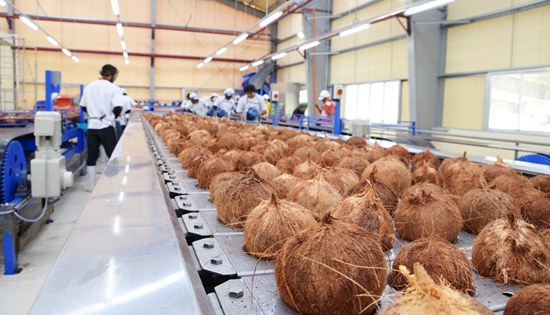
By
DTI-MSG-Knowledge Management and Information Service
March 3, 2023
Eating without guilt
Almost 12 years ago, the
doctors made it clear to Leyte-born Andy Albao that he would need to
adopt healthier diet options if he was to fully recover from his
kidney ailment. With his condition, he switched to an alternative
and healthier food sweetener, the coco sugar.
Soon, he and his family –
including his four children – began using coco sugar for their
dietary requirements. However, sourcing affordable coconut sugar was
difficult, and this is when Andy’s interest in developing coconut
by-products germinated.
At the time, Andy was
running a smooth business from Makati supplying industrial spare
parts.
Turning a quest into an
opportunity
The need and drive towards
a healthier lifestyle led to the founding of Andy Albao’s
Corporation - CocoWonders in 2011. Andy’s personal interest in using
coconut sugar led to the company to produce 60 coconut products
including coconut jam, coconut chocolate spread and virgin coconut
oil.
Today, the entrance of the
administrative office premises of Coco wonders in Makati City is
adorned with a range of value-added coconut products indicative of
the many uses of the fruit.
Award-winning export
journey to Europe
Set up with an initial
capital of 2.5 million pesos (approximately $135,000 today),
CocoWonders was already exporting coconut products to Australia
after obtaining the FDA certification by the third quarter of 2011.
Initially, the export revenue was approximately $10,000 per year.
Today, it stands between $50,000-$60,000 per year with 35 permanent
employees providing their services.
The company now exports to all major markets including Spain,
Netherlands, Switzerland, Poland and the Czech Republic in the
European Union, where CocoWonders enjoys a good following.
Approximately 40% of Cocowonder’s production is exported to the EU.
The European market holds a special place in Andy’s heart. “European
buyers are aware and have the purchasing power. In 2014, we began
exporting to Europe as well. We penetrated more markets than others
and have been awarded ‘Best SME’ by the Philippine Coconut
Association (PCA) and the Department of Agriculture (DA) two years
in a row, in 2020 and 2021.”
Andy grows coconuts at a rented farm in Quezon, that are processed
at his production facility nearby.
All these years, the family has been working hard to achieve
excellence with two sons helping their father with accounts and
production. With progressive introduction of automation, today
approximately 70% of production is mechanised. While business is
going well, there are some challenges.
“The war in Ukraine resulted in lower sales, but we continue. Most
of the customers in Europe are health conscious and do not
compromise on that.”
Andy is hopeful that the situation will improve soon.
Do that which is needed
The Philippines is one of the major producers of coconut sugar in
the world. CocoWonders produces coconut sugar that is EU organic
certified and compliant with good manufacturing practices (GMP).
In fact, this is one of the first requirements that Andy recalls he
had to meet before beginning to export to Europe
“In 2013, I participated in Anuga Trade Fair held in Germany.
Customers did not buy from us because we were not EU organic
certified at that time.”
He then set himself the duty to correct this quickly.
“In 2015, we applied for organic certification. This opened the
doors for us to European buyers.”
Andy worked with Netherlands based Control Union Certifications to
obtain the required certifications.
Support from government
Andy fondly recalls the support he received from the Centre for
International Trade Expositions and Missions (CITEM), the export
trade promotion arm of the Department of Trade and Industry (DTI).
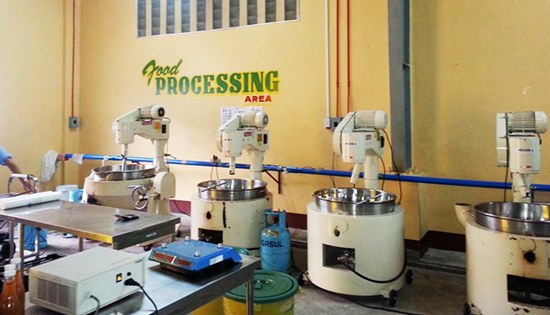
Certified endorsement from DTI to participate in the international
fairs, renting of appropriate exhibition space, and support with
visa requirements has always been useful, according to Andy.
Being a member of the Virgin Coconut Oil Producers and Traders
Association of the Philippines (VCO Philippines) was also
instrumental for Andy in maintaining a strong connection with the
DTI to receive support to participate in international trade fairs.
The company also improved its marketing thanks to government
support.
He attributes his company’s achievements in the export arena to
being actively engaged with DTI to remain on top of the latest
developments for Philippine exporters.
Accessing the EU market through the GSP+
The DTI also enabled CocoWonders to register in the EU’s Registered
Exporter system (REX system), a system of self-certification of
origin for exporters wishing to benefit from GSP+.
DTI assisted Andy along with other exporters in taking advantage of
the EU-GSP+.
“Availing of the GSP+ has made me more competitive in the European
market. Customers don’t need to pay tariffs once we avail of the GSP+.
We don’t need to pay for Certificate of Origin every time we make a
shipment. Now we just include our REX number in the commercial
invoice, and we are sorted.”
As a result, exporting to Europe has become manageable for
CocoWonders.
Expanding through ARISE Plus Philippines
With the opportunities available for coconut producers in Europe,
Andy responded to the call for application launched under ARISE Plus
Philippines for MSMEs in Coconut flour and VCO interested in
receiving support on Export Marketing and Market Linkages, including
the EU market.
Offered in partnership with the DTI and private sector
organizations, the support package is providing CocoWonders and
others with comprehensive capacity-building through coaching and
training on branding, marketing, and export strategy and planning,
as well as preparation for trade fairs, including sales and
negotiations. Selected beneficiaries may also benefit from the
support to participate in trade fairs and other trade events,
including overseas.